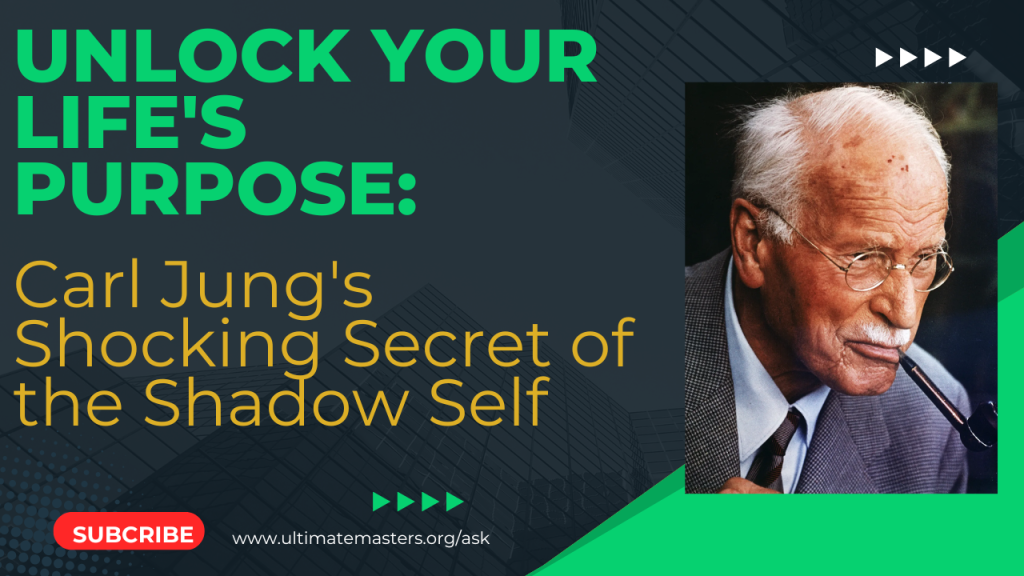Are you searching for meaning in your life? Carl Jung, the legendary psychologist, believed the key lies not in your achievements, but deep within your unconscious – your shadow self. In this article, we explore Jung’s profound ideas on how confronting your dark side can actually illuminate your unique path and purpose. Learn how to perform shadow work, embrace your hidden traits, and turn them into your greatest strengths. Discover how accepting both the good and bad and taking action are essential for a meaningful life. Don’t just exist; actively create your purpose through self-discovery and courage. You will also learn to embrace fear, because that is where your task is. Join us to uncover Jung’s secrets to living a balanced, authentic, and purpose-driven life.
WeCarl Jung’s philosophy on finding life’s purpose. Jung believed that purpose isn’t about achievements, but self-discovery through exploring one’s “shadow,” or unconscious self. This involves acknowledging repressed emotions and traits, integrating them into one’s personality, and taking action based on one’s values. The process, Jung argued, is a continuous journey of self-improvement, embracing both positive and negative experiences. Ultimately, a meaningful life stems from actively engaging with one’s fears and striving towards authentic self-expression, not solely from achieving external goals. The video encourages viewers to engage in self-reflection and proactive behavior to create a fulfilling life.
FAQ: Exploring Your Shadow and Finding Meaning According to Jungian Philosophy
- What is the primary purpose of human existence according to Carl Jung?
- According to Jung, the primary purpose of human existence isn’t about achieving specific external goals or successes, but rather about “kindling a light of meaning in the darkness of mere being.” This meaning is found not in accomplishments but through the process of self-discovery and the actions taken along the way. It’s about understanding who you truly are, embracing all aspects of your psyche (both conscious and unconscious), and living authentically.
- What does Jung mean by the “shadow,” and how does it relate to our life’s purpose?
- The “shadow” refers to the hidden, unconscious part of our psyche that holds repressed desires, emotions, and traits we often consider negative or undesirable. It can include feelings like anger, envy, or laziness, as well as interests we’re ashamed of. Jung believed that the key to finding our unique purpose lies within our shadow, as it contains traits and energies that, once understood and integrated, can be leveraged to live a more complete and meaningful life.
- How can we begin to explore and understand our own shadow?
- Exploring the shadow involves a process of introspection and self-reflection, often called “shadow work.” Techniques include journaling, meditation, and regularly questioning your thoughts, behaviors, and feelings. Ask yourself: Why did I act that way? Did it feel authentic? What was my initial instinct? Also, observe your judgments of others, as these can reveal traits you are repressing in yourself. The goal is to become aware of and accept these shadow traits, not to be defined by them.
- Why is it important to acknowledge and integrate our shadow traits instead of repressing them?
- Repressing shadow traits doesn’t make them disappear; rather, it often gives them more power. These traits can manifest as sudden outbursts, burnouts, or other detrimental ways. By acknowledging and understanding them, we can learn how to use them in a positive and constructive way. For example, anger can be used for self-advocacy, envy can serve as motivation, and even laziness can indicate a need for rest. The aim is to integrate them into our personality, becoming a “whole” person rather than a fragmented one.
- What role does “taking action” play in finding meaning, according to Jungian philosophy?
- According to Jung, understanding oneself and one’s shadow is not enough to find meaning; action is crucial. We must move beyond a reactive existence, initiating change and purpose in our lives. This means actively pursuing our goals, contributing to the world in a way that aligns with our values, and not waiting for things to happen to us. Meaning comes not from thoughts but from practice.
- How does fear relate to our purpose and meaning, according to Jung?
- Jung suggests that “where your fear is, there is your task.” Fear often stems from the risk involved in taking action and living authentically. Instead of avoiding fear, we should acknowledge and analyze it. Ask yourself what you’re afraid of and what could go wrong. Preparation can help mitigate fear, but it shouldn’t lead to inaction or rumination. Ultimately, bravery involves facing our fears rather than avoiding them. What we fear is often a guide to where our life will gain the most meaning.
- Is a life free of bad experiences necessary for a meaningful life?
- No, a life devoid of hardship is not a meaningful life. According to Jung, a truly meaningful life requires a balance of good and bad, joy and sadness. Bad experiences and mistakes provide opportunities for growth, self-discovery, and resilience. They also provide the context necessary to appreciate positive experiences. It is in the challenges and efforts, not necessarily the achievements, that we find meaning.
- What is the overall key to finding purpose according to Jungian philosophy?
- The key lies in a continuous process of self-discovery, integrating the shadow, and taking deliberate action. It is not about a final destination or achievement, but rather about the journey. The purpose of life is found in the continuous act of becoming oneself: being a unique individual, and having the determination to act on what is discovered. We find meaning in embracing both our good and bad aspects, not in striving for perfection.

Quiz
- According to Jung, what is the primary purpose of human existence?
- What does Jung mean by the term “psyche,” and what two major aspects does it encompass?
- How does Jung describe the “shadow,” and where is it located?
- What is “self-realization,” according to Jung, and why is it important?
- Describe what is meant by “persona” in Jungian psychology and how it relates to the shadow.
- Explain the concept of “projection” in the context of shadow work.
- How can one make use of the traits discovered in the shadow, according to Jung?
- What is the relationship between action and meaning, as explained in this source?
- According to Jung, why is fear a significant element in achieving a meaningful life?
- How does Jung view the balance between positive and negative experiences in a meaningful life?
Quiz Answer Key
- According to Jung, the primary purpose of human existence is to kindle a light of meaning in the darkness of mere being. It’s about finding individual purpose rather than achieving external goals.
- The psyche encompasses the entirety of an individual’s being, including both the conscious (ego) and the unconscious. The conscious is everything one is aware of, while the unconscious is the hidden part of the psyche.
- The shadow is the dark side or the hidden part of the unconscious that holds repressed desires, emotions, and traits. It contains the aspects of ourselves that we are often ashamed of or wish to ignore.
- Self-realization is the process of getting to know the conscious and unconscious parts of yourself; it’s necessary to understand who you are before you can determine your life’s purpose.
- The persona is the mask we wear when interacting with the world. It’s the role we unconsciously play to be liked or appreciated by others, often hiding our true selves, and can keep us from our shadow.
- Projection is when we see the traits or behaviors we despise in others that are often the ones we fear in ourselves. By recognizing projection, we can learn to identify and understand our own shadow traits.
- Jung suggests embracing and integrating shadow traits into our personality rather than ignoring them. He believes our shadow is meant to teach us and can even be useful and motivating.
- Action is crucial to finding meaning, as Jung believes that the purpose of life is found in practice rather than just thoughts or words. One must initiate change instead of just reacting.
- Fear is significant because Jung believed that where fear is, that is where our task is; facing fears and addressing them leads to a more meaningful life.
- Jung views the balance between positive and negative as necessary for a meaningful life. Sadness gives depth to joy, and challenges are opportunities for growth, and a life without challenges lacks significance.
Essay Questions
- Analyze how the concept of the “shadow” can be both a source of personal conflict and a path towards self-understanding and wholeness according to Jungian philosophy.
- Discuss the role of self-reflection and shadow work in Jungian psychology, focusing on how these practices can contribute to an individual’s journey of self-discovery.
- Compare and contrast the concepts of persona and shadow, explaining how they interact within the individual’s psyche and how understanding both aspects can lead to personal growth.
- Evaluate the importance of taking action and embracing fear in Jungian philosophy, particularly in the context of finding meaning and purpose in life.
- Explore Jung’s perspective on the relationship between happiness and sadness in a meaningful life, explaining how the acceptance of both positive and negative experiences is essential for a fulfilling existence.
Glossary of Key Terms
- Psyche: The entirety of an individual’s being, encompassing both conscious and unconscious aspects.
- Ego: The center of consciousness; everything we are aware of, our identity.
- Unconscious: The part of our psyche that is hidden, containing repressed desires, emotions, and traits.
- Shadow: The dark side of our unconscious, containing repressed and often undesirable aspects of ourselves.
- Self-Realization: The process of understanding and integrating both conscious and unconscious parts of oneself; necessary for discovering one’s life purpose.
- Persona: The mask we wear to interact with the world, often hiding our true selves to gain acceptance.
- Projection: The act of attributing one’s own shadow traits to others, often leading to judgment and irritation.
- Shadow Work: The practice of regularly reflecting on one’s behaviors, thoughts, and feelings to understand and integrate the shadow.
- Meaning: The purpose and significance one finds in life, achieved through self-discovery, action, and embracing challenges.
- Integration: The process of bringing the conscious and unconscious elements of the self into balance, leading to a whole, authentic person.
Related Posts

Technical Analysis: 4 Stocks with signs of death crossovers to keep an eye on

HDFC Bank & 3 other fundamentally strong stocks trading above 200 DMA to keep an eye on

Falling Channel Breakout: Multibagger NBFC Stock Shows Bullish Momentum on Daily Chart

4 Fundamentally strong stocks to buy for an upside potential of up to 36%; Do you hold any?



















0 responses on "Unlock Your Life's Purpose: Carl Jung's Shocking Secret of the Shadow Self"